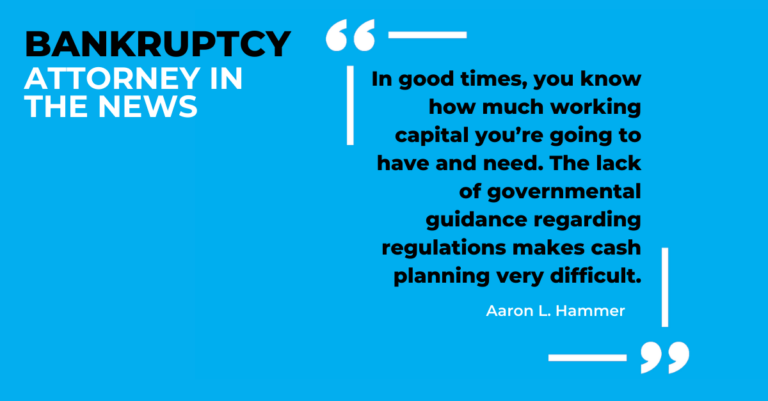In this ABI Journal article, Aaron L. Hammer discusses the impact of COVID-19 on the restaurant industry and managing Red South Beach through the crisis.
Download the full article here.
Read MoreThe 2019 novel coronavirus disease (COVID-19) has created unprecedented distress in many industries. Arguably, the hardest hit to date is the restaurant industry. Getting through a workout during COVID-19 has proven quite challenging. The complete lack of visibility into government support during the Fall and Winter 2020 made it difficult to create workout plans. Debtors cannot reliably predict how much liquidity they will have or will require, thus making it difficult for lenders or sources of new equity to assess their options. The unfortunate net result has been the closure of thousands of restaurants across the United States.
Aaron cited uncertainty as a chief concern in the industry. He brings a unique perspective as not only a workout lawyer, but also as managing partner of Red South Beach, an award-winning steakhouse in Miami Beach Florida. “Uncertainty is the biggest challenge,” Aaron said. “In good times, you know how much working capital you’re going to have and need. The lack of governmental guidance regarding regulations makes cash planning very difficult.”
In some cases, necessity has also proven to be the mother of invention. In the case of RED South Beach, it will begin offering their raw signature cuts and spices for home delivery throughout the United States, tapping a totally new source of revenue for the restaurant..
As we wait for the proliferation of vaccines, and as the country works toward a return to normal, fallout will certainly continue. Those restaurant groups that have survived by successfully pivoting to delivery models and identifying other ways to increase revenues, cutting operating costs to a minimum, and negotiating lease adjustments, will need to continue to be nimble as regulations shift and consumer demand remains uncertain. The landscape will be altered, with the number of single- and low unit-count restaurant groups likely drastically reduced. However, those restaurants still standing in 2021 should be well positioned to capitalize long-term on the vacuum created by restaurants that did not survive crisis.



